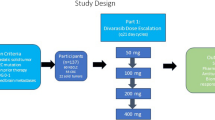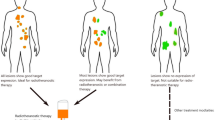Abstract
Lenvatinib (Lenvima™) is a multitargeted receptor kinase inhibitor that inhibits the kinase activities of vascular endothelial-derived growth factor receptors 1, 2 and 3, fibroblast growth factor receptors 1, 2, 3 and 4, platelet-derived growth factor receptor α, RET and KIT. In addition to their role in normal cellular function, these kinases have been implicated in pathogenic angiogenesis, tumour growth and cancer progression. Lenvatinib is being developed by Eisai Co. Ltd for the treatment of solid tumours, primarily for differentiated thyroid cancer, and other malignancies. A capsule formulation of the drug has received approval in the USA for use in locally recurrent or metastatic, progressive, radioactive iodine-refractory differentiated thyroid cancer. Lenvatinib is in pre-registration for this indication in the EU, Australia, Brazil, Canada, Japan, South Korea, Russia, Singapore and Switzerland, and is in phase 3 development in Argentina, Chile and Thailand. Lenvatinib has orphan designation in the EU and Japan for use in differentiated thyroid cancer. In addition, an ongoing global, phase 3 trial is evaluating the use of lenvatinib as first-line treatment in unresectable hepatocellular carcinoma. This article summarizes the milestones in the development of lenvatinib leading to this first approval in locally recurrent or metastatic, progressive, radioactive iodine-refractory differentiated thyroid cancer.
Similar content being viewed by others
References
Stjepanovic N, Capdevila J. Multikinase inhibitors in the treatment of thyroid cancer: specific role of lenvatinib. Biologics. 2014;8:129–39.
Jasmin S, Ozsari L, Habra MA. Multikinase inhibitors use in differentiated thyroid carcinoma. Biol Targ Ther. 2014;8:281–91.
Alonso-Gordoa T, Diez JJ, Duran M, et al. Advances in thyroid cancer treatment: latest evidence and clinical potential. Ther Adv Med Oncol. 2015;7(1):22–38.
Eisai Inc. Lenvima (lenvatinib) capsules, for oral use: US prescribing information. 2015. http://www.fda.gov. Accessed 24 February 2015.
Matsui J, Yamamoto Y, Funahashi Y, et al. E7080, a novel inhibitor that targets multiple kinases, has potent antitumor activities against stem cell factor producing human small cell lung cancer H146, based on angiogenesis inhibition. Int J Cancer. 2008;122(3):664–71.
Glen H, Mason S, Patel H, et al. E7080, a multi-targeted tyrosine kinase inhibitor suppresses tumor cell migration and invasion. BMC Cancer. 2011;11:309.
Matsui J, Funahashi Y, Uenaka T, et al. Multi-kinase inhibitor E7080 suppresses lymph node and lung metastases of human mammary breast tumor MDA-MB-231 via inhibition of vascular endothelial growth factor-receptor (VEGF-R) 2 and VEGF-R3 kinase. Clin Cancer Res. 2008;14(17):5459–65.
US FDA. FDA approves lenvima for a type of thyroid cancer (media release). http://www.fda.gov/newsevents/newsroom/pressannouncements/ucm434288.htm. Accessed 13 February 2015.
Schlumberger M, Tahara M, Wirth LJ, et al. Lenvatinib versus placebo in radioiodine-refractory thyroid cancer. N Engl J Med. 2015;372(7):621–30.
Eisai Co Ltd. U.S. FDA approves anticancer agent Lenvima™ (lenvatinib mesylate) as treatment for radioactive iodine-refractory differentiated thyroid cancer. 2015. http://www.eisai.com. Accessed 24 February 2015.
European Medicines Agency. Public summary opinion on orphan designation: lenvatinib for the treatment of follicular thyroid cancer. 2013. http://www.ema.europa.eu. Accessed 24 February 2015.
European Medicines Agency. Public summary opinion on orphan designation: lenvatinib for the treatment of papillary thyroid cancer. 2013. http://www.ema.europa.eu. Accessed 24 February 2015.
Eisai Co Ltd. Eisai and Quintiles enter into a strategic collaboration to develop Eisai’s anticancer compounds (media release). http://www.eisai.co.jp. Accessed 30 October 2009.
Eisai Co Ltd. Eisai to accelerate late-stage clinical development of new drugs by effectively leveraging external resources (media release). http://www.eisai.com. Accessed 7 September 2011.
Biologics Inc. Lenvima™ (lenvatinib) approved for radioactive iodine-refractory differentiated thyroid cancer, available through Biologics Inc (media release). http://www.biologicsinc.com. Accessed 13 February 2015.
Okamoto K, Ikemori-Kawada M, Jestel A, et al. Distinct binding mode of multikinase inhibitor lenvatinib revealed by biochemical characterization. ACS Med Chem Lett. 2015;6(1):89–94.
Tohyama O, Matsui J, Kodama K, et al. Antitumor activity of lenvatinib (E7080): an angiogenesis inhibitor that targets multiple receptor tyrosine kinases in preclinical human thyroid cancer models. J Thyroid Res. 2014. doi:10.1155/2014/638747.
Yamamoto Y, Matsui J, Matsushima T, et al. Lenvatinib, an angiogenesis inhibitor targeting VEGFR/FGFR, shows broad antitumor activity in human tumor xenograft models associated with microvessel density and pericyte coverage. Vasc Cell. 2014;6:18.
Okamoto K, Kodama K, Takase K, et al. Antitumor activities of the targeted multi-tyrosine kinase inhibitor lenvatinib (E7080) against RET gene fusion-driven tumor models. Cancer Lett. 2013;340(1):97–103.
Bruheim S, Kristian A, Uenaka T, et al. Antitumour activity of oral E7080, a novel inhibitor of multiple tyrosine kinases, in human sarcoma xenografts. Int J Cancer. 2011;129(3):742–50.
Molina AM, Hutson TE, Larkin J, et al. A phase 1b clinical trial of the multi-targeted tyrosine kinase inhibitor lenvatinib (E7080) in combination with everolimus for treatment of metastatic renal cell carcinoma (RCC). Cancer Chemother Pharmacol. 2014;73(1):181–9.
Schlumberger M, Jarzab B, Cabanillas ME, et al. A phase II trial of the multi-targeted kinase inhibitor lenvatinib (E7080) in advanced medullary thyroid cancer (MTC) (abstract no. IS8-4). Ann Oncol. 2012;23(8 suppl 11):xi35–xi6.
Havel L, Lee JS, Lee KH, et al. E7080 (lenvatinib) in addition to best supportive care (BSC) versus BSC alone in third-line or greater nonsquamous, non-small cell lung cancer (NSCLC) (abstract no. 8043). J Clin Oncol. 2014;32(15 suppl 1).
O’Day S, Gonzalez R, Kim K, et al. A phase II study of the multitargeted kinase inhibitor lenvatinib in patients with advanced BRAF wild-type melanoma (abstract no. 9026). J Clin Oncol. 2013;31(15 suppl 1).
Vergote I, Teneriello M, Powell MA, et al. A phase II trial of lenvatinib in patients with advanced or recurrent endometrial cancer: angiopoietin-2 as a predictive marker for clinical outcomes (abstract no. 5520). J Clin Oncol. 2013;31(15 suppl 1).
Okita K, Kumada H, Ikeda K, et al. Phase I/II study of E7080 (lenvatinib), a multitargeted tyrosine kinase inhibitor, in patients (pts) with advanced hepatocellular carcinoma (HCC): initial assessment of response rate (abstract no. 320). J Clin Oncol. 2012;30(4 suppl 1).
Boss DS, Glen H, Beijnen JH, et al. A phase I study of E7080, a multitargeted tyrosine kinase inhibitor, in patients with advanced solid tumours. Br J Cancer. 2012;106(10):1598–604.
Koyama N, Saito K, Nishioka Y, et al. Pharmacodynamic change in plasma angiogenic proteins: a dose-escalation phase 1 study of the multi-kinase inhibitor lenvatinib. BMC Cancer. 2014;14:530.
Shumaker RC, Zhou M, Ren M, et al. Effect of lenvatinib (E7080) on the QTc interval: results from a thorough QT study in healthy volunteers. Cancer Chemother Pharmacol. 2014;73(6):1109–17.
Shumaker R, Aluri J, Fan J, et al. Evaluation of the effects of formulation and food on the pharmacokinetics of lenvatinib (E7080) in healthy volunteers. Int J Clin Pharmacol Ther. 2014;52(4):284–91.
Dubbelman AC, Rosing H, Nijenhuis C, et al. Pharmacokinetics and excretion of 14C-lenvatinib in patients with advanced solid tumors or lymphomas. Invest New Drugs. 2015;33(1):233–40.
Shumaker R, Aluri J, Fan J, et al. Effect of ketoconazole coadministration on lenvatinib (E7080) exposure in healthy volunteers. Clinical study. 2012; 24th EORTC-NCI-AACR international conference on molecular targets and cancer therapeutics.
Shumaker RC, Aluri J, Fan J, et al. Effect of rifampicin on the pharmacokinetics of lenvatinib in healthy adults. Clin Drug Investig. 2014;34(9):651–9.
Shumaker R, Aluri J, Fan J, et al. Influence of hepatic impairment on lenvatinib pharmacokinetics following single-dose oral administration. J Clin Pharmacol. 2014.
Finn RS, Cheng AL, Ikeda K, et al. A multicenter, open-label, phase 3 trial to compare the efficacy and safety of lenvatinib (E7080) versus sorafenib in first-line treatment of subjects with unresectable hepatocellular carcinoma (abstract no. TPS4153). J Clin Oncol. 2014;32(15 suppl 1).
Yamada K, Yamamoto N, Yamada Y, et al. Phase I dose-escalation study and biomarker analysis of E7080 in patients with advanced solid tumors. Clin Cancer Res. 2011;17(8):2528–37.
Nishio M, Horai T, Horiike A, et al. Phase 1 study of lenvatinib combined with carboplatin and paclitaxel in patients with non-small-cell lung cancer. Br J Cancer. 2013;109(3):538–44.
Maio M, Hassel JC, Del Vecchio M, et al. Lenvatinib combined with dacarbazine versus dacarbazine alone as first-line treatment in patients with stage IV melanoma (abstract no. 9027). J Clin Oncol. 2013;31(15 suppl 1).
Calvo E, Becerra C, Maio M, et al. A Phase Ib/II study of lenvatinib (E7080), a VEGFR and FGFR tyrosine kinase inhibitor (TKI), in combination with dacarbazine (DTIC) versus DTIC alone as first-line therapy in patients with stage IV melanoma: Phase Ib safety and efficacy results (abstract no. SMR-P43). Pigment Cell Melanoma Res. 2011;24(5):1035.
Sachdev P, Hamid O, Kim K, et al. Analysis of serum biomarkers and tumor genetic alterations from a phase II study of lenvatinib in patients with advanced BRAF wild-type melanoma (abstract no. 9058). J Clin Oncol. 2013;31(15 suppl 1).
Disclosure
The preparation of this review was not supported by any external funding. During the peer review process the manufacturer of the agent under review was offered an opportunity to comment on the article. Changes resulting from any comments received were made by the authors on the basis of scientific completeness and accuracy. L. J. Scott is a salaried employee of Adis, Springer SBM.
Author information
Authors and Affiliations
Corresponding author
Additional information
This profile has been extracted and modified from the Adis R&D Insight drug pipeline database. Adis R&D Insight tracks drug development worldwide through the entire development process, from discovery, through pre-clinical and clinical studies to market launch.
Rights and permissions
About this article
Cite this article
Scott, L.J. Lenvatinib: First Global Approval. Drugs 75, 553–560 (2015). https://doi.org/10.1007/s40265-015-0383-0
Published:
Issue Date:
DOI: https://doi.org/10.1007/s40265-015-0383-0




